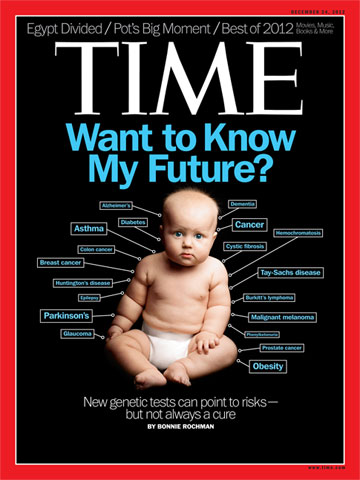
Know your enemy, we tell ourselves; knowledge is power. Laurie Hunter wanted to know what disease was attacking her daughter Amanda, who by the age of 2 months was not developing normally. Her muscle tone was low. She wasn't lifting her head. She was slow to talk, and she didn't walk until she was 2.
"As a mother, you know that everything that happens to your child is not your fault, yet you still feel responsible," says Hunter, 42, a high school English teacher who lives in Jackson, N.J. "We turned to genetic testing because I wanted answers." The first tests, done at the Children's Hospital of Philadelphia (CHOP) when Amanda was 4, came back normal. So did another round when she was 9. Doctors could not figure out what was making Amanda weak--even as she got weaker and slower and stopped being able even to blow her nose. "It's like her muscles are getting tighter and not moving in the way they should," Hunter said. But the doctors held out hope. Genetic testing grows more sophisticated every day, they said, allowing researchers to explore a child's health down to every last typo on a chromosome.
In March, a third round of tests found seven genes missing from Amanda's first chromosome. At last, Hunter thought, when the genetic counselor called and asked to see her. "It felt like finally I might have an answer." But it was not the answer she was looking for. The small deletion, the counselor said, did not explain Amanda's condition. That was still a mystery. And now a whole new threat appeared.
One of the seven deletions has been linked to very rare tumors. The geneticists wanted Amanda, who is 14, to be screened by an oncologist. "It was like, Oh, my God, now we are adding cancer to the mix," Hunter says. "Never in a million years did I think this would be an issue."
She was even more surprised when a counselor called after her own tests came back. "I know you're going to be upset," the counselor said, "but we found that you have the same deletion." And so might her other two children.
This is the world we are heading into: one with powerful new weapons against age-old diseases and a host of questions about how to use them wisely and not turn them on ourselves. Imperfect knowledge can make us crazy--or bankrupt--chasing down threats that may never materialize. The human genome is an exquisitely complex blueprint. Geneticists hunting for answers to mysterious symptoms invariably trip over incidental findings, genetic twists they were not even looking for that might signal a risk of cancer or Alzheimer's or Parkinson's in the near or distant future. But do doctors have to tell patients everything they learn, even about the risk of diseases for which there are not yet cures? Do parents have to tell their children what might await them as adults? And who will pay for all this? "Everyone at this point is flying by the seat of their pants," says Dr. James Evans, a medical geneticist at the University of North Carolina School of Medicine. "The technology is outpacing us."
From Labs to Living Rooms
